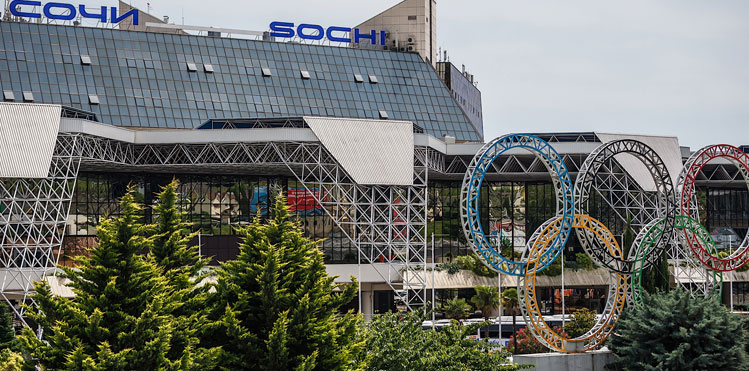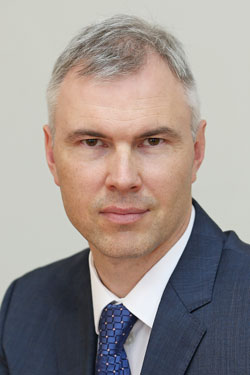
Sochi entered the global spotlight in 2014 when it hosted the Winter Olympic Games. The airport welcomed over 5.2 million travellers last year – a 29% year-on-year increase. That trend has continued into 2017, with 20% growth recorded in the period from January to April.
An interview with Leonid Sergeev, CEO Basel Aero, operator of Sochi International Airport. By Ross Falconer
Sochi, located on Russia’s Black Sea coast, entered the global spotlight in 2014 when it hosted the Winter Olympic Games. This sporting connection has since been further amplified – Sochi is home to the Russian Formula 1 Grand Prix until at least 2020, and will be one of the host cities for the 2018 FIFA World Cup.
Despite the economic downturn in Russia, Sochi International Airport has demonstrated significant growth in passenger numbers. Over 5.2 million travellers were welcomed last year – an impressive 29% year-on-year increase. That trend has continued into 2017, with 20% growth recorded in the period from January to April.
While famous for hosting the 2014 Winter Olympics, Sochi is known as the unofficial ‘Summer Capital’ of Russia, or the ‘Black Sea Pearl’. “The government of Krasnodar Region makes a great contribution towards development of the tourism industry in Sochi, evenly distributing significant events during the year,” says Leonid Sergeev, CEO Basel Aero, operator of Sochi International Airport. “The number of destinations connected to Sochi is growing thanks to the resort’s popularity. The airlines support this resort development trend, and work towards increasing load factors. We are sure the airport can do even better, as soon as comprehensive activities are conducted to attract tourists not only during the summer season, but during the winter as well.”
Indeed, tourist infrastructure, including hotels, restaurants and amusement parks, was significantly improved for the 2014 Winter Olympics. This has helped increase traffic in the winter season, with more tourists visiting the Olympic ski venues of Krasnaya Polyana.
Currently, 40 airlines operate regular and charter flights to Sochi, and the airport’s route network includes 60 domestic and international destinations. Most recently, Ural Airlines started twice-weekly services to Sochi from Tbilisi – the first time the route has been served for five years. While it is too early to identify trends on the route, it has historically been popular, and Sergeev emphasises the strong potential both for welcoming tourists from Georgia and for transit traffic.
Sochi Airport factbox
2016: 5.2 million passengers
2016 passenger traffic growth: 29%
2017 passenger traffic growth (Jan-Apr): 20%
Number of routes: 60
Top 3 destinations: Moscow, St Petersburg, Ekaterinburg

Leonid Sergeev, CEO Basel Aero: “The number of destinations connected to Sochi is growing thanks to the resort’s popularity. The airlines support this resort development trend, and work towards increasing load factors.”
Significantly, Sochi gained Open Skies status in October 2014, meaning any foreign carrier may pick up and drop off passengers and cargo with no restrictions on aircraft type or frequency. In addition, foreign airlines are allowed to operate transit flights between third countries with a stopover in Sochi, where they can take new passengers onboard. “The Open Skies status certainly promotes the development of international passenger traffic,” Sergeev explains. “Eight airlines used the special conditions in 2016: Israir Airlines, Mahan Air, Qeshm Airlines, Taban Air, Meraj Airlines, SCAT Airlines, SkyBus Airlines, and Turkish Airlines. For comparison, Open Skies status flights were operated by only three airlines in 2015: Mahan Air, Turkish Airlines, and SCAT Airlines. In February 2017, Condor implemented its charter programme at Sochi thanks to the Open Skies status. Sochi, as an all-season resort, can become a new destination for travellers from many countries.”
Building on this, the airport’s network development strategy is focused on increasing direct services to both Europe and Asia. Following two years of work to stimulate the Chinese market, a Sochi-Chengdu service is expected to be launched this year, and efforts are underway to secure services to six other Chinese cities: Beijing, Zhengzhou, Ürümqi, Shanghai, Kunming, and Guangzhou. Sochi is the second Russian city, after St Petersburg, to establish cultural and business ties with Chengdu. The launch of direct air links between the two cities is a top priority, along with cultural exchange programmes and mutual business projects.
“European tourists are also interested in Sochi, so the operation of direct flights from Amsterdam, Düsseldorf, Frankfurt, and Helsinki is planned,” Sergeev adds. “As for today, there are already flights from Tehran and Tel Aviv in the schedule, but we are working to increase frequencies and open new routes from countries in the Middle East.”
Service quality and technological innovation
Sochi places technological innovation and continuous improvement of the passenger experience at the heart of its strategy. Self-service check-in and bag drop are already prevalent, while there are also plans to launch an automated boarding gate and a baggage drop off service. About 30% of travellers currently use self-service check-in at Sochi.
“One of the major projects in the field of service quality improvement is ‘Service Blue Printing’, which involves the development of behaviour and communication standards for employees during their interaction with passengers,” Sergeev explains. “This year, the airport continues to work on improvement of skills by applying the best international practices, which combine safety, passenger flow growth, and a friendly atmosphere.”
Sochi Airport has its own Training Centre for employees, and holds competitions on a monthly and quarterly basis to select the most client-oriented members of staff.
It is also embracing digital communication as part of its passenger engagement efforts. The airport is currently upgrading its website to make it more user-friendly and fully responsive for tablets and smartphones, while an active social media presence is central to the communication strategy (it has 2,000 ‘likes’ on Facebook, 2,000 followers on Twitter, and almost 5,000 followers on Instagram).

United Airlines launched a twice-weekly year-round services between Sochi and Tel Aviv on 13 April. The route was made possible by the Open Skies status that Sochi gained in October 2014, allowing any foreign carrier to operate international services to Sochi without restrictions and to perform transit flights.
“On our web pages, passengers can learn about new destinations, promotions and events held at the airport and in the city, and about the opening of new retail or catering outlets,” says Sergeev. “We monitor the responses of our passengers on a daily basis, analyse and solve problems, and respond promptly to each query.”
This focus on service quality improvement and technological development remains Sochi’s priority, alongside the development of regional and international services, and an increase in passenger traffic. “To improve the service and to increase the capacity, we plan to upgrade the terminal, improve the in-house infrastructure, and continue to work on the implementation of modern technologies,” Sergeev concludes.







